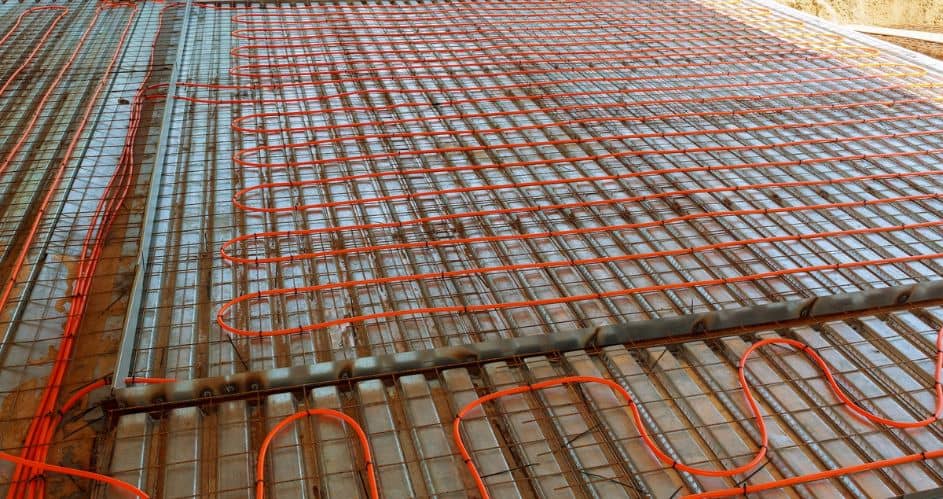
Thanks to today’s technology, we now have lots of options on how to stay warm and toasty during the chilly Australian winters. A rising star in the world of heating systems is hydronic heating – a unique one, but definitely memorable.
Let’s dive deeper into the what’s and how’s of hydronic heating, and whether it’s worth the hype.
Demystifying Hydronic Heating
First, let’s demystify what hydronic heating is and how it works. At its core, hydronic heating operates on a surprisingly straightforward principle. It circulates hot water through a network of pipes or panels, which are cleverly hidden behind walls or under the floors of your home.
As the water flows through these concealed passages, it radiates warmth into your living spaces, much like an enigmatic and gentle force.
Unlike traditional heating systems, which rely on the mysteriously roaring flames of gas furnaces or the electrical magic of resistance coils, hydronic heating operates using a flame-less process.
Pros of Hydronic Heating
Let’s get straight to the point, here are some of the pros of using hydronic heating systems for your home:
Energy Efficiency
Hydronic heating revolves around circulating hot water through concealed conduits, a secret recipe that heats your rooms evenly and maintains a consistent temperature.
Compared to traditional heating systems that heat your place up by blowing equally hot air, hydronic heating is an advocate of minimising heat loss, making it a clear winner for energy efficiency.
In the long run, this energy efficiency that hydronic heating practises can lead to lower energy bills and a reduced carbon footprint.
Comfort and Consistency
The radiant warmth of hydronic heating envelops your living spaces in a soothing and unbroken cocoon of heat. Say goodbye to the troublesome cold spots and draughts that often accompany other heating systems.
The even distribution of this enigmatic warmth means you can walk around in bare feet during winter without a shiver.
Allergy-Friendly
Hydronic heating doesn’t rely on the movement of air, making it an excellent choice for those who are vulnerable to the mysterious allergens that lurk in the unseen corners of our homes.
Traditional systems, driven by invisible currents of air, often stir up dust and pollen, leaving a trail of sneezes and itchy eyes. But with hydronic heating, there’s no air movement to awaken lurking allergens, creating a healthier indoor environment that seems to work its own brand of magic.
Silent Operation
In a world where noise pollution is practically everywhere, hydronic heating is like a breath of fresh air, thanks to its silent operation. This is especially beneficial for light sleepers, people who prefer quiet spaces, and families with young children whose naps seem to depend on a tranquil ambiance.
No more noisy fans or blowers; you can stay warm and peaceful in the comfort of your home.
Zone Control
You can command specific areas or rooms to be warm while leaving others untouched. This feature provides a personalised heating experience and can help further reduce energy consumption by heating only specific areas.
Low-Maintenance
Hydronic heating systems are known for their minimal maintenance requirements. As long as you get the installation and regular checks right, they can last you for many years with little to no need for major repairs.
Aesthetic Appeal
Hydronic heating systems come in various designs, including radiators and underfloor heating, which can subtly upgrade your home’s aesthetics. If you prefer them hidden, these systems can also be discreetly integrated into your home’s interior.
Cons of Hydronic Heating
As the popular saying goes, nothing is perfect – and that includes hydronic heating. Here are some factors to watch out for before using it in your home:
Upfront Cost
Compared to conventional heating systems like electric heaters and gas furnaces, the price of hydronic heating systems is really up there. But look at it this way, with the massive pros of hydronic heating, buying one for your home is like investing in your long-term savings, energy bills, and comfort.
Installation Complexity
The installation of a hydronic heating system is like unravelling a cryptic puzzle. It can be more complex and time-consuming than other heating options, often involving the laying of pipes or the installation of radiators, which may require modifications to your home’s structure.
This can extend the installation timeline and further increase the upfront costs.
Energy Source
Before hydronic heating systems can work, they have to have a heat source to heat the water that will flow through their “secret” passages. Don’t worry though, you have lots of options to choose from – you can go gas, electric, or even solar.
However, remember that whatever energy source you end up with will drastically affect your initial budget and environmental impact, so better choose wisely.
Space Requirement
Hydronic heating systems can take up more space than other heating systems, particularly if you opt for radiators or baseboard heaters. This may limit your interior design options and influence the overall layout of your home.
Slower Response Time
When it comes to hydronic heating systems, patience is truly a virtue. Hydronic heating systems take slightly longer to heat water up and circulate it throughout your home.
Especially when you’re approaching the cold winter months, using hydronic heating comes with mastering the art of timing to make sure your home is as warm and cosy as it should be.
Ready to Switch to Hydronic Heating?
The perplexing efficiency of hydronic heating is a key factor to consider when evaluating this magical heating system for your home. It offers numerous advantages, including energy efficiency, comfort, allergy-friendliness, zone control, silent operation, and low maintenance.
However, the upfront cost, installation complexity, energy source considerations, space requirements, and slower response times are potential challenges to keep in mind.
Ultimately, the decision to install hydronic heating should align with your heating needs, budget, and long-term goals. Regardless of your decision, know that you are just one purchase away from experiencing the magic of hydronic heating systems.
